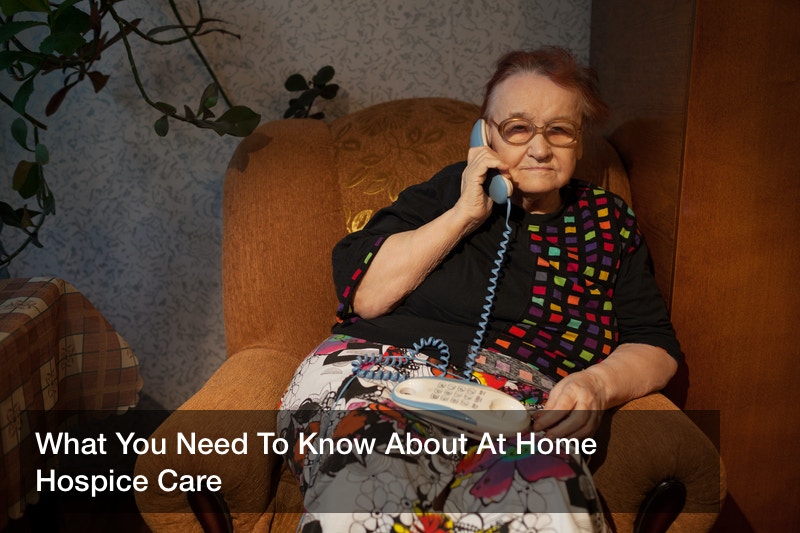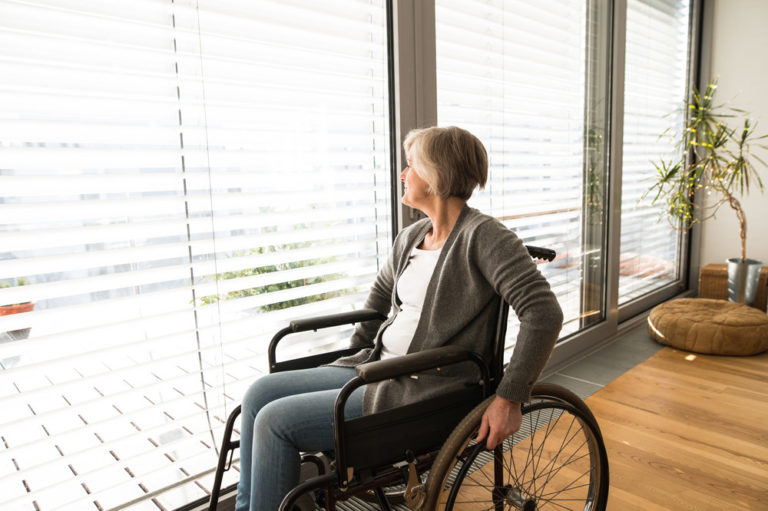
At-home hospice care can help your family shoulder many burdens. While many hospitals and health care centers offer on-site hospice care, for many families, at-home care is preferred. You can ensure that your loved ones are comfortable and receiving proper care.
Often, family members are an integral part of hospice care. In some situations, they may be the primary caregiver. However, you can also use in-home nurses and other medical staff to provide assistance. This way, your loved ones can receive top-notch medical care in comfortable and familiar surroundings.
So if you’re looking for local hospice care, make sure you consider at-home care. It doesn’t get more local than that.
You might have some questions about hospice care. If so, it’s wise to chat with a medical professional. You might wonder can a hospice patient go to the hospital? The answer, generally speaking, is yes. Wondering can get hospice care in a nursing home? Again, the answer is yes and nursing homes are among the leading hospice care providers.
Can someone survive hospice care? Unfortunately, hospice care refers to end-of-life care. That said, some people do survive hospice care. In some situations, they may even enjoy greatly improved health. And either way, the right medical treatments can ease pain and suffering. You can also ask about alternatives to hospice care.
Most people have at least heard of at home hospice care, but many people do not exactly understand how at home hospice care works. To take advantage of this type of care there is a criteria that has to be met.
Working closely with a physician is the way to start the process of arranging for at home hospice care. Learning more about the process and what type of care it can provide will ensure that you are well prepared for this type of service.
By Definition
Hospice care is normally provided in the home. Typically at home hospice has a family member as the primary care giver. Hospice care is comfort care for the terminally ill. The person receiving the care is not expected to recover from an illness and the prognosis is that they have as little as 6 months of life left.
Hospice care can be provided in the home, at the hospital, or in a designated care facility. The care is focused on keeping the patient comfortable. In some cases, the patient will have to be admitted to the hospital for short periods to attend to a secondary infection or medical problem.
While a family member is often the primary caregiver they are not alone. They are provided support from a range of professionals to help them manage the care and prepare for the inevitable. The family caregiver is provided training, can qualify for respite care, and become part of the at home hospice care team.
Who Are the Other People Involved in At Home Hospice Care?

There is a whole team of professionals that provide care to the patient and to the family of the patient with at home hospice care. Here are some of the professionals that can be a part of the hospice care team:
- Doctors. There will be a team of doctors involved in the decision making for the patient.
- Nurses. There will be visiting nurses assigned to the team that will help to manage medication, support the patient and the family caregiver.
- Home health care workers. Paraprofessionals like nurses aids and others will attend to the patient and work with the primary caregiver to ensure the patient gets the personal care that they need. They will also provide respite care so that the caregiver can leave and attend to their own life.
It is not easy to make decisions on your own when you are making choices for a family member. Working with a team can help to ensure that your loved one gets the best in care.
All the Decision Making

Ideally long before a patient is moved into hospice care they have made an end of life planning decisions so that the family does not have to make these tough decisions. There are a lot of hard conversations that have to be had when someone is moved into at home hospice care.
Meeting with an estate planning lawyer before moving into hospice care can reduce the burden on family down the road. Many patients that sense their illness is taking a turn for the worse, will take on the responsibility of making the tough decisions so that their family does not have to.
If you or a loved one have been told that at home hospice care is likely in your future, you can help your family get through those times by taking control of the situation and making key decisions before you or your loved one is unable to.
Yes, it is very uncomfortable to have to talk about funeral service while someone is very much alive, but talking about it now will ensure that all the planning is done down the road. Many people are making the choice to preplan their funeral and pay for it in advance so that their family does not have to worry about it.
Meeting with a funeral director in advance of needing to meet with a funeral director is not only a smart move to protect loved ones in the future it is a smart financial move. Prepaying for funeral services and arrangements locks in the pricing. The cost of end of life arrangements is always on the upward trajectory.
Of course, you and your loved ones can make decisions before the grief is overwhelming about what type of services are wanted. For example, with a clear calm head, you can evaluate whether cremation services are the right choice, or if a burial is a right choice. It is a lot easier to make decisions about these things when they can be made together in advance.
End of life arrangements are not the only decisions that need to be made. A family law attorney can provide advice about other decisions that may need to be made about care for any dependents that may be left behind.
Other decisions that will have to be made include:
- Health care and heroic measures. A DNR (do not resuscitate order) is an order that the patient signs that request that there are no heroic measures taken like CPR or being put on a ventilator to continue life.
- Decisions when to stop treatments. Many patients are faced with setting a timeline on when they will stop treatments. For example, cancer patients may have to decide if this will be their last attempt at chemotherapy.
- Who will be able to make decisions for them. A health care power of attorney, and other powers of attorney, assign a person to be able to make decisions on the patient’s behalf.
The power of attorneys deserves to be discussed further. With a health care power of attorney, a general power of attorney, and even a specific power of attorney, the patient is giving power to the individual to make many choices for them. It is important that the person that is granted the power of attorney fully understands the patients wishes, and that they act as a trusted fiduciary in implementing those wishes in their decision-making on behalf of the patient.
Powers of attorney are powerful tools. Choosing the right people for the job is critical. For example, choosing a loved one that believes someone should continue to fight even when the doctors and the patient for that matter do not believe that the fight will do any good is not the best person to appoint.
At home hospice care may mean making some changes to the home. Making decisions about which changes are needed to the physical setting can also be made with the team.
Changes to the Home That Makes Life Easier For Everyone

At home hospice care often requires that some temporary changes are made to accommodate the patient. A nurse and other team members may visit the home and recommend some changes to help to make the job of caring for your loved one easier.
Here are some of the changes you may have to make:
- A little bathroom remodeling. You may have to add things like handrails in the bathroom if your loved one is still ambulatory. Safety is vital.
- Certain services that not traditional to your home may have to be arranged.
- Adding a hospital bed and making arrangements for the patient to stay on the lower level of the home.
You may have to add safety features in the bathroom which may include calling a certified plumbing company to install a walk-in shower, a lowered toilet, and other amenities that will help the patient to continue to use the bathroom as their condition deteriorates.
The team can help to arrange for biological waste removal if it is needed. You can’t throw used needles and IV bags and other biological waste in the trash can. You will need specialized waste removal services to manage the waste.
It can be difficult if not impossible for hospice patients to navigate stairs and get around. Making room on the first floor of the home for the patient’s bed can help. It can be easier for the caregiver and the patient to have the patients bed centrally located in the home for at home hospice care.
Making decisions about safety, convenience, and the best possible way to provide care is best managed by allowing the team to help make decisions. They bring experience and have the knowledge base to recognize safety threats that the average layperson does not.
Providing At Home Hospice Care
If you will be the primary caregiver providing at home hospice care. It is important that you are well-prepared to provide this level of care. Depending on the patients needs the care can include personal care, medication administration, and round the clock monitoring.
There are some key things any at home hospice care provider should do:
- Make sure you care for yourself. Keeping up with your own health care is important. You cannot help anyone else if you get sick.
- Tap into support. When it becomes too much for you get support in the form of respite care.
- Seek counseling when it is needed. Caring for a loved one can be overwhelming if you feel overwhelmed seek mental health support.
It can be very easy to be consumed by the care that you have to provide during at home hospice care. Take advantage of the respite care that is offered by your team. Taking a break not only will renew you but will help you to be a more patient care provider.
It is important that any caregiver makes some time for themselves each day. Whether they spend that time exercising, or simply sitting quietly and meditating, it is important that they have some me time to regroup each day.
Your commitment to your loved one is admirable, but that commitment cannot supersede your own health care needs. You have to stay healthy so that you can provide care. Many caregivers make the mistake of thinking that the more they suffer the better care they are providing. The fact is the more you suffer the less able you are to provide care. Experts recommend seven to eight hours of sleep every night, get rest.
Enlist the help of other family members, friends, and neighbors. Learn to take the help that is offered. People want to help accepting the help is not a sign of not being able to manage the care on your own.
Acceptance is Healing

Many patients and caregivers go into at home hospice care with the belief that this is a temporary situation and that the patient will improve. The fact is, if at home hospice care is being recommended by the medical team, it is because there is nothing left to do to slow or stop the disease.
Many families struggle with the idea that there is nothing left to do medically. They will continue to search for answers and waste valuable time that they could be spending together and making some memories.
Family counseling can help to get every family member on board with the idea that at home hospice care is the final step in treatment. In many families, there are one or more people that are struggling to accept the situation and they can cause stress for the family members that are providing care or that have accepted the situation.
One of the goals with at home hospice care is to provide comfort care, and an environment of peace. In fighting among family members does not promote either. Family counseling services can help to ease some of the discourse and help every family member including the patient to accept the nature of the situation.
At home hospice care has often been described as a healing time for families where old wounds are put to the side, and families come together with a common goal. Family counseling can help your family to find the peace that you need to manage at home hospice care.
Consult with your doctor and care team about at home hospice care options that are available to you and your family. Gathering as much information about at-home hospice care before the care is needed is the best way to be able to make informed decisions in the future. Knowledge is power when it comes to health care options and planning.







